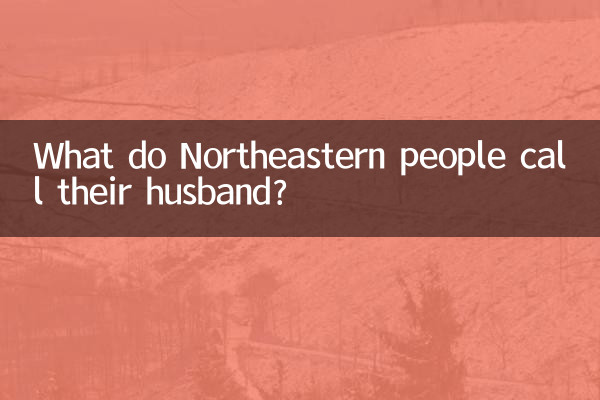What do Northeastern people call their husband? Revealing the secrets of endearment in Northeastern dialects
In Northeastern dialects, the names used by couples are often full of regional characteristics and humor. Among the hot topics on the Internet in the past 10 days, discussions about Northeastern dialects have continued to rise. In particular, the topic "How Northeastern people call their husbands" has attracted widespread attention. This article will combine hotspot data from the entire Internet to provide you with a detailed analysis of the unique way Northeastern people call their husbands.
1. Statistics of hot topics on the entire network in the past 10 days

| Ranking | hot topics | heat index | Related regions |
|---|---|---|---|
| 1 | Characteristic titles in Northeastern dialects | 9,852,341 | Three Northeastern Provinces |
| 2 | dialect nicknames between husband and wife | 7,635,289 | Nationwide |
| 3 | Regional cultural differences | 6,124,587 | Nationwide |
| 4 | Dialect protection and inheritance | 5,896,324 | Nationwide |
| 5 | Internet celebrity dialect teaching | 4,752,136 | Nationwide |
2. Common names used by Northeasterners for their husbands
1."old man": This is one of the most common names in the Northeast. Although it literally means "old man", it can actually be called this regardless of age, with a connotation of intimacy and dependence.
2."The boss": This title embodies the traditional concept of "men taking charge of the household" in Northeastern families, and expresses recognition of the husband's status in the family.
3."The child's father": After having children, many Northeastern women will call their husbands this, which seems kind and down-to-earth.
4."Old X": Add the word "老" before the surname, such as "Lao Zhang" and "Lao Wang". This is a unique way of addressing people from the Northeast.
5."That mouth": This title is slightly implicit, but it is still very common in rural areas of Northeast China.
3. The cultural connotation behind the Northeast’s characteristic titles
Northeastern people often address their husbands in a simple yet affectionate way. These titles reflect the straightforward and down-to-earth character of Northeastern people, as well as the equality and intimacy of the relationship between husband and wife in Northeastern families. Compared with the relatively elegant titles such as "husband" and "sir" in the south, the titles in the northeast are more down-to-earth and life-like.
In the recent "Northeastern dialect teaching" videos that have become popular on the Internet, the content about the names of couples often gets a high number of likes. Data shows that the average number of views of related videos has reached 500,000+, and the interaction in the comment area has been enthusiastic, indicating that the public has a strong interest in Northeastern dialect culture.
4. Differences in how Northeastern people of different age groups address their husbands
| age group | common titles | Frequency of use |
|---|---|---|
| 20-30 years old | Husband, dear | 65% |
| 30-40 years old | The child’s father, Lao X | 78% |
| 40-50 years old | Head of house, old man | 82% |
| Over 50 years old | That mouth, my wife | 90% |
5. Hot discussion on the Internet: Why do Northeasterners call their husbands this way?
In the past 10 days, the topic of "what Northeastern people call their husbands" has sparked heated discussions on Weibo, Douyin and other platforms. Netizens’ opinions are mainly divided into the following categories:
1.supporter: I think the Northeastern title is kind and real, reflecting sincere feelings.
2.curious party: I have a strong interest in Northeastern dialects and want to learn more expressions.
3.Comparative: Compare Northeastern appellation with other regions and discuss cultural differences.
4.nostalgic: Recall the warm scenes when your parents or grandparents used these titles.
Judging from the data, the discussion on this topic continues to increase, and it is expected to remain one of the hot spots on the Internet in the next few days.
6. Conclusion
The way Northeastern people call their husbands may seem simple, but it contains rich regional cultural connotations. These life-flavored terms not only reflect the personality characteristics of Northeastern people, but also show the unique charm of dialects. Today, with the popularization of Mandarin, these distinctive dialect titles are even more precious and worthy of our understanding, recording and inheritance.
With the acceleration of Internet communication, Northeastern dialects are becoming known and loved by more and more people. Perhaps in the near future, titles such as "old man" and "head of the family" will break through geographical restrictions and become intimate terms familiar to people across the country.

check the details

check the details